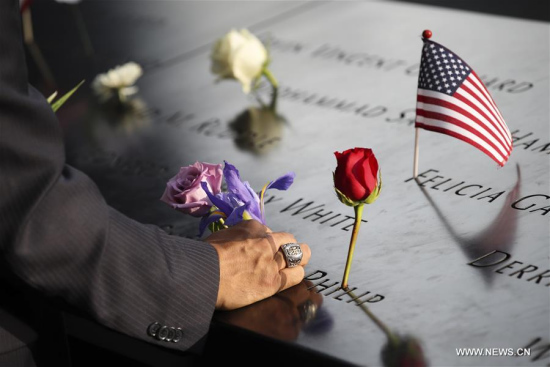
A man places a flower on a plate on which the names of 9/11 victims were inscribed around the South Pool at the National September 11 Memorial and Museum in New York, the United States, on Sept. 11, 2017. (Xinhua/Wang Ying)
Over the last 16 years, the global terrorism landscape has evolved with the structure of terrorist groups now being more decentralized. What is unchanged, unfortunately, is a U.S. strategy with diplomacy remaining on the sidelines.
After the deadly 9/11 terror attacks, then U.S. President George W. Bush signaled a strong willingness to launch military action unilaterally by proclaiming that "Either you are with us or you are with the terrorists."
Sixteen years later, while the U.S. administration now seeks more cooperation with other countries in fighting terrorism - partly because of the urgency to share the costs of counter terrorism - the domain of collaboration is mainly confined to military campaign.
"Diplomacy plays very little role (in U.S. counter terrorism strategy)," Marvin Weinbaum, professor emeritus of political science at University of Illinois at Urbana-Champaign and director for Pakistan Studies at The Middle East Institute, told Xinhua.
"What is wrong with American policy is that it fails to recognize that you can't have sustainable military success without progress in state building," said Weinbaum.
Without improved governance and service delivery to the local society, any military gains made will be lost, he warned.
On Monday, in his first commemoration of the 9/11 attacks at the Pentagon, U.S. President Donald Trump pledged that terrorists have "nowhere to hide."
"American forces are relentlessly pursuing and destroying the enemies," said Trump. "We're making plain to these savage killers that there is no dark corner beyond our reach, no sanctuary beyond our grasp, and nowhere to hide anywhere on this very large Earth."
At a time when the country was marking the 16th anniversary of the 9/11 attacks and was still stuck in its longest war in Afghanistan, Trump made no mention of the role diplomacy could play in fighting terrorism.
"We've reached a point in this country that our foreign policy for decades has been based on a military-first approach," Matthew Hoh, a former U.S. State Department official and now a senior fellow at the Center For International Policy, told Xinhua in the past.
In less than a month, the United States' war in Afghanistan will also enter its 17th year.
In his speech on the strategy in Afghanistan and South Asia last month, Trump said that a "fundamental pillar" of his strategy was "the integration of all instruments of American power, diplomatic, economic, and military."
Despite putting diplomacy before military action in his remarks, what he said immediately afterwards contained apparent contradictions.
"Perhaps it will be possible to have a political settlement that includes element of the Taliban in Afghanistan, but nobody knows if or when that will ever happen," said Trump.
"America will continue its support for the Afghan government and the Afghan military as they confront the Taliban in the field," he added.
According to analysts, after more than a decade of intense military action in Afghanistan, insufficient role played by diplomacy has taken it toll.
"Diplomacy can play several roles. First you can use diplomacy to influence other countries and groups to help you," said Richard Stoll, professor of political science at Rice University.
"For example, using diplomacy you may be able to persuade countries and groups to deny the terrorists sanctuary, supplies, recruits, etc.," he added.
Among many other scholars and experts, Stoll argued that it would be reasonable for the United States to consider expanding the use of diplomacy in its counter terrorism campaign.
Their message is clear: it would be a never ending war on terror if Washington fails to eliminate the root causes of terrorism and extremism. And to achieve that goal, diplomacy should take the leading role.


















































